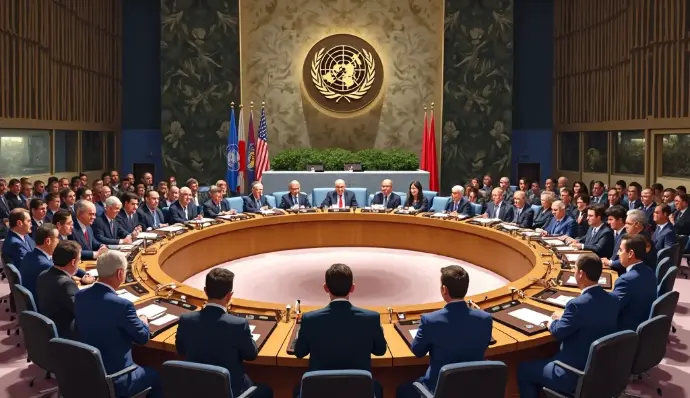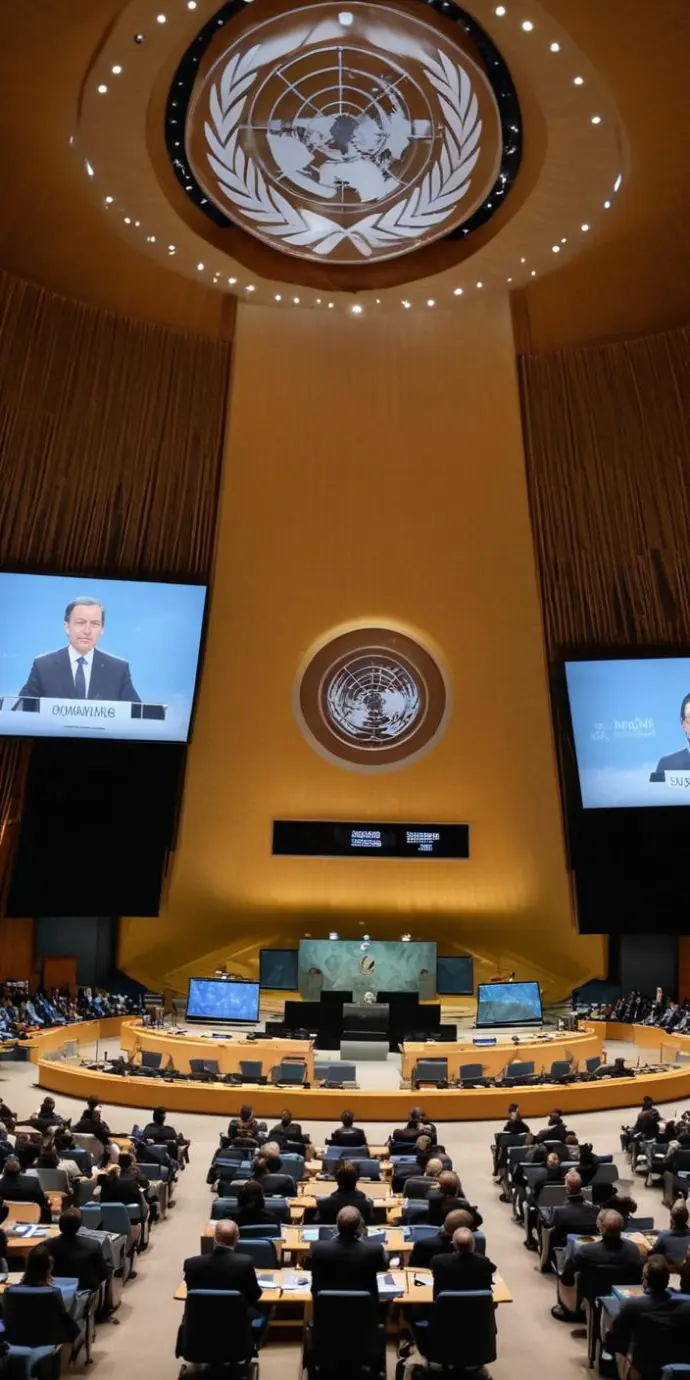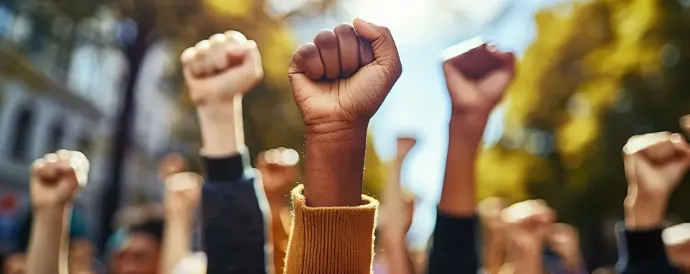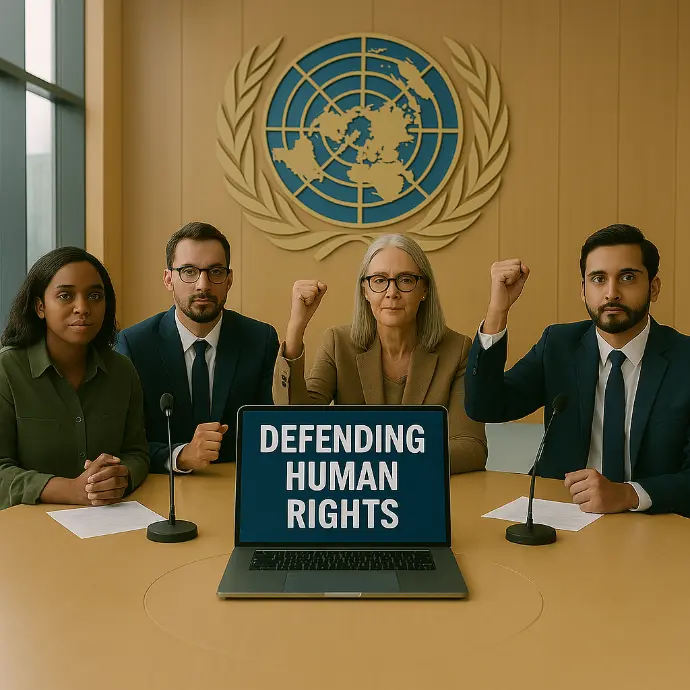The Contribution of Supranational Institutions in the Protection of Human Rights




In this space, we will embark on a detailed analysis and in-depth reflection on human rights at the international level. From the role that supranational institutions play in safeguarding human rights to the challenges and progress made in this area, here you will find all the information you need to understand and act in defense of the fundamental rights of all people. Are you ready to immerse yourself in the exciting world of human rights defense? Let's begin by exploring how supranational institutions contribute to this cause!
Introduction
In the context of global human rights, the contribution of supranational institutions is essential to ensuring their defense and protection throughout the world. These institutions play a fundamental role in promoting and safeguarding human rights in various nations and regions, and their work is crucial to ensuring respect for international standards in this area.
Supranational entities are organizations that possess authority and power that exceed the sovereignty of individual states. These institutions have the power to establish regulations, make binding decisions, and exert influence over member countries in specific areas. Examples of such entities include the European Union, the European Court of Human Rights, and the International Criminal Court, among others.
These organizations are designed to transcend national borders and collaborate to achieve common goals, such as the promotion of human rights globally. Their power is based on international treaties and their reach encompasses several countries, giving them a unique role in the protection of human rights internationally.
The role of supranational entities in safeguarding human rights is vital to ensuring that fundamental standards and principles are respected worldwide, providing a normative and legal framework that transcends the borders of each nation.
The protection of human rights at the international level is essential to safeguard human dignity, equity, and justice in all regions of the planet. Human rights are universal, indivisible, and interdependent, and their respect is crucial for the development of peaceful, inclusive, and sustainable societies.
Supranational entities play a key role in the protection of human rights at the international level, as they have the capacity to monitor compliance with international treaties, investigate allegations of violations, and issue resolutions that affect multiple countries. Their work contributes to making human rights a tangible reality for people around the world, regardless of their nationality or location.
Cooperation between supranational entities and member states is essential to address transnational human rights challenges, such as migration, climate change, armed conflict, and discrimination. These organizations provide a legal and political framework that allows these issues to be effectively addressed globally.
The contribution of supranational entities to the protection of human rights is situated in a context of growing global interdependence, where human rights challenges cross national borders and require international responses. The work of these organizations is essential to address complex problems affecting multiple countries and to ensure that human rights are uniformly respected throughout the world.
The establishment and strengthening of cooperation mechanisms between supranational entities and member states is crucial to address emerging human rights challenges, promote accountability, and ensure access to justice for victims of violations. This context of collaboration and dialogue is essential to ensure that the contribution of supranational entities has a significant impact on the protection of human rights at the global level.
History of Supranational Institutions in the Protection of Human Rights
Supranational institutions have emerged as a solution to the need to safeguard and promote human rights internationally. A clear example is the European Union, which has established a system for the protection of human rights through the European Court of Human Rights, which has authority over member states and ensures compliance with the European Convention on Human Rights. Likewise, the Organization of American States, through the Inter-American Commission on Human Rights, is responsible for the defense of human rights in the Americas.
Over time, these institutions have undergone a process of evolution, expanding their scope of action and strengthening their protection mechanisms. Their role has become crucial in the defense of human rights, helping to establish international standards and monitoring their compliance by member states.
The creation and evolution of these supranational institutions has been essential to the consolidation of a system for the protection of human rights at the regional and global levels, establishing effective mechanisms to ensure their respect and fulfillment.
Supranational institutions play a vital role in the protection of human rights at the international level. Their duty is to ensure that the fundamental rights of all people are respected, protected, and fulfilled at all times. This entails carrying out a variety of functions and responsibilities, including the promotion, monitoring, and implementation of measures to ensure respect for human rights in all sectors.
In addition to ensuring compliance with international human rights treaties and conventions, these institutions are responsible for issuing recommendations, preparing reports, and adopting resolutions that promote the defense of human rights in member countries. They are also empowered to investigate allegations of human rights violations and take corrective action when necessary.
Thus, supranational institutions play an essential role in the protection and promotion of human rights globally, contributing to the construction of a more just, equitable, and respectful environment for human dignity.
Supranational institutions establish strategic partnerships with non-governmental organizations, specialized UN agencies, and other relevant actors in the field of human rights. This collaboration is essential to ensuring a comprehensive and coordinated response to human rights violations occurring in different parts of the world.
Non-governmental organizations play an essential role in identifying problems, denouncing violations, and advocating for victims of abuse. For their part, supranational institutions have the political support and authority necessary to promote change at the national and international levels, as well as to hold perpetrators of human rights violations accountable.
Cooperation between supranational institutions and non-governmental organizations strengthens the capacity to respond to crisis situations, contributing to the effective protection of human rights worldwide.
Decisions and resolutions taken by supranational entities have a considerable impact on the safeguarding of human rights worldwide. These decisions can affect the policies and practices of Member States, as well as influence the jurisprudence and interpretation of international human rights agreements.
Furthermore, the resolutions of these entities can help highlight situations of human rights violations, generate political and social pressure for change, and set precedents that strengthen the system of human rights protection at the international level.
Therefore, the impact of decisions and resolutions of supranational entities transcends borders, contributing to the promotion of a culture of respect for human rights and the guarantee of justice and equality for all people in the global context.
Challenges and Questions Regarding the Work of Supranational Organizations in the Protection of Human Rights
One of the main obstacles faced by supranational organizations in the protection of human rights is the application and enforcement of safeguard measures. Decisions adopted at the supranational level are frequently limited in their implementation at the national level, either due to a lack of political will, legal restrictions, or resistance from local actors. This can compromise the effectiveness of the proposed measures, leaving victims unprotected and weakening the authority of supranational organizations.
Another significant challenge is the scarcity of resources and the limited capacity of these institutions to monitor and ensure compliance with protection measures, which can create significant discrepancies between decisions taken at the supranational level and their effective implementation in member countries.
Furthermore, the complexity of international relations and the diversity of legal systems represent an additional challenge for the effective implementation of protection measures at the global level, requiring a coordinated and collaborative approach between supranational organizations and member states.
Supranational organizations have been questioned regarding their effectiveness and their ability to act impartially in the protection of human rights. Some critics argue that the bureaucracy and politicization of these institutions can hinder their ability to effectively address human rights violations, undermining trust in their work and their legitimacy.
Furthermore, the lack of clear mechanisms to evaluate and measure the impact of the actions undertaken by these organizations has generated uncertainty about their actual effectiveness in protecting human rights at the global level. The absence of clear indicators and the difficulty in attributing concrete results to the work of these institutions have fueled criticism about their true impact on the defense of human rights.
The impartiality of supranational organizations has also been called into question, especially in situations where political or economic interests may influence their decisions, raising questions about their ability to act fairly and impartially in the protection of human rights in different contexts.
Conflicts of interest and geopolitical tensions represent a considerable challenge in the actions of supranational organizations in the defense of human rights. The diversity of perspectives, national interests, and political agendas among member states can make it difficult to adopt effective and coherent measures to address human rights violations globally.
Furthermore, the influence of world powers and strategic interests can affect the decision-making of these organizations, raising questions about their ability to act independently and with a focus on the protection of human rights. This dynamic can undermine the credibility and legitimacy of supranational organizations, weakening their ability to play an effective role in defending human rights in complex and conflict-ridden contexts.
In this sense, the need to address conflicts of interest and geopolitical tensions presents a key challenge for strengthening the work of supranational organizations in protecting human rights globally.
Importance of International Collaboration in the Protection of Human Rights
Strategic alliances between international organizations and sovereign nations are crucial for the protection of human rights worldwide. These partnerships allow for the establishment of cooperation and coordination mechanisms that strengthen the response capacity to humanitarian crises and human rights violations.
An example of this is the European Union's collaboration with entities such as the UN and the OAS, which seeks to promote the defense of human rights in various regions of the world. This cooperation has facilitated the implementation of humanitarian assistance programs and the monitoring of electoral processes in countries where civil and political rights violations have been reported.
Furthermore, these alliances foster the exchange of good practices and the unification of human rights standards, contributing to the creation of a more robust and effective international regulatory framework.
Coordination of efforts between international organizations and sovereign nations is vital to effectively address humanitarian crises and systematic human rights violations. This collaboration enables a rapid and organized response to emergencies, ensuring the protection and assistance of affected populations.
The African Union, for example, has collaborated closely with the UN to address humanitarian crises in several African countries. This cooperation has facilitated the deployment of peacekeeping missions and the delivery of humanitarian aid in areas affected by armed conflict and natural disasters.
Furthermore, coordination of efforts includes the supervision and monitoring of crisis situations, as well as the implementation of measures to prevent the escalation of conflicts and protect the most vulnerable populations.
The development of joint strategies for the promotion and defense of human rights at the global level is an essential component of collaboration between international organizations and sovereign nations. These strategies seek to strengthen the capacity to respond to global human rights challenges, such as discrimination, gender-based violence, and the protection of the rights of migrants and refugees.
Collaboration between the Council of Europe and the UN, for example, has led to the creation of comprehensive strategies for promoting gender equality and defending minority rights in different countries. These strategies include the implementation of training programs, the preparation of periodic reports, and the monitoring of the human rights situation in various regions of the world.
Furthermore, the development of joint strategies also encompasses the promotion of human rights education and public awareness, seeking to generate greater commitment and participation in the defense of human rights globally.

Conclusions
Supranational organizations have played a fundamental role in the promotion and defense of human rights globally, significantly contributing to the protection of these essential rights. Through the formulation of resolutions, guidelines, and recommendations, these entities have established international normative frameworks that serve as a guide for Member States and the international community at large.
Furthermore, these institutions have exerted pressure on States to fulfill their human rights responsibilities, resulting in important advances in the guarantee of these rights in various parts of the world. Their monitoring and oversight work has made it possible to detect and report human rights violations, helping to bring to light problems that might otherwise remain hidden.
However, it is clear that supranational institutions face multiple challenges in their mission to protect human rights. The lack of effective enforcement mechanisms, the resistance of certain States to abide by their decisions, and the need to adapt to the changing dynamics of global geopolitics are significant obstacles that require creative responses and renewed strategies.
To improve their work in the future, supranational institutions must focus on the effective implementation of their decisions, foster collaboration with non-state actors, and promote greater citizen participation in the defense of human rights. It is also crucial that these entities continue to adapt to global changes, anticipate future scenarios, and develop agile and effective mechanisms to address emerging challenges in the field of human rights.
Furthermore, the creation of strategic alliances with civil society organizations, the private sector, and other relevant actors can offer new opportunities to amplify the impact of their work and generate synergies that strengthen the defense of human rights globally.
In short, the commitment and adaptability of supranational institutions will be key to consolidating and expanding their contribution to the protection and promotion of human rights at the international level.
The impact of supranational institutions on the consolidation of human rights at the international level has been significant, as they have set standards, monitored their compliance, and denounced violations globally. Their work has contributed to creating a favorable environment for respect for human rights, raising awareness and putting pressure on States to improve their practices and policies in this area.
Furthermore, their role in disseminating good practices, promoting intercultural dialogue, and cooperation between States has strengthened the protection of human rights as an ethical and legal imperative at the global level. The work of these institutions has facilitated significant progress in consolidating a culture of respect for fundamental rights, laying the foundations for a future in which the protection of human dignity is a shared priority for the international community.

 IHRO NEWS
IHRO NEWS